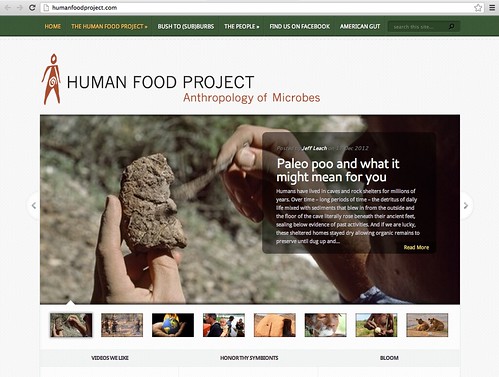Cool Toys Pic of the Day – Human Food Project and the American Gut

Image by rosefirerising
Human Food Project:
humanfoodproject.com/
Human Food Project: American Gut:
humanfoodproject.com/american-gut/
American Gut:
www.indiegogo.com/americangut
I bet when you first saw the title of this you thought it was going to
be something about food or hunger, and obesity in the United States.
Nope! This is about all those little creepy crawly things that live in
us which may or may not actually be "us", depending upon how you
define "us."
I first heard about the Human Microbiome Project
(www.hmpdacc.org/ and commonfund.nih.gov/hmp/) from the
folks over at the University of Michigan Risk Science Center (UMRSC),
where certain individuals are fascinated with not just the microbiomes
of our body but also the microbiomes of various portions of our
personal environments. Is the gunk growing in my showerhead the same
as what grows in yours? Not likely.
While scientists were fascinated with the microbiome long before
ordinary folk had heard of it, the word finally broke into popular
thought with Michael Specter’s New Yorker article, "Germs Are Us."
He’s not joking. The researcher at the UMRSC had told me roughly three
quarters of our body is comprised of cells that do not have human DNA.
Mind-blowing, isn’t it?
For me, personally, my interest in tracking research in microbiomics
has paralleled activities in my personal life with personalized
genomics and personalized medicine. I’ve been blogging the personal
genomics (PGEN) story at PGEN Participant
(pgenpt.wordpress.com/). I’ve found that my PGEN activities
have absolutely turned my life around. Not saying things are perfect
or close, but my health has improved lightyears since implementing
changes and interventions that were unlikely to have happened without
it. Trust me, I’ve been seeing docs and specialists and coming away
with bags of medications for twelve years now. We’d tried a lot. Then
the PGEN info, and BAM! Off the old meds, change of diet, some over
the counter vitamins, and I feel like a new woman.
The early studies of the human microbiome show the potential to have
as huge of an impact as the personalized genomics work has. This is
huge. Revolutionary. As I’ve been tracking this, I’ve felt so jealous
of those folk who’ve been able to participate in the early microbiome
research, and wished I could have been one of them.
Well, THAT is what the Human Food Project is about. I could read their
website all day, there is so much fascinating content.
In their own words:
"Nobody tells a giraffe how to eat. But for the first time in history,
humans don’t know what to eat. We no longer know what human food is.
In just a few thousand centuries, our kind has gone from nesting in
trees, to making stone tools and digging roots, to kindling fires, to
subduing flora and fauna, to finally erecting massive cities and
dropping rovers onto distant planets. …Therefore, it is correct to
say that a great many diseases of the modern world represent a
discordance with the ancient microbial world.
The biological reality that we are vessels to a vast microbial
ecosystem is radically altering our basic understanding of medicine,
nutrition, public health and the very scientific foundation of what
makes us sick. The Human Food Project is an effort to understand
modern disease against the back drop of our ancestral past. Through a
better understanding of human ecology at different time scales, the
coevolution of us and the trillions of microbes that live on and in
our bodies is likely to open new doors to understanding."
humanfoodproject.com/about-the-human-food-project/
So that’s the Human Food Project part, digging into past and present
resources to look at how humans used to eat, how we eat now, and what
we can learn from all of this. There is a lot to learn. And it will
take a lot of us in order to make this a useful area of study. What we
are learning can move slow or fast, depending in part on how many folk
are involved. There are many conditions that scientists believe may be
associated with changes in the human microbiome, from autism to
celiac, from diabetes to cancer, from rheumatoid arthritis to
psoriasis or Sjogren’s, and along the way virtually every other
autoimmune or chronic disease. I want to see solutions. I want a lot
of folk involved. And that is why it is so exciting to see the
American Gut project. Now any of us can get involved, if we have the
money, and we don’t even have to go through a doctor. We can just pay
at the Indiegogo crowdfunding site to participate in the research
project.
In their words:
"The Human Microbiome Project sampled healthy adults. Now the rest of
us can participate. Want to find out what’s in your gut, your
partner’s, your kid’s, or even your dog’s?"
Sadly, for me, I just recently paid for the genomics tests and can’t
afford the microbiome tests, but I sure hope some of you will. And I’m
sure the prices will drop soon, won’t they? In the meantime, maybe
you’ll want to take a peek at this video on microbiomics.
The assembly of an infant gut microbiome framed against healthy human adults:
www.youtube.com/watch?v=Pb272zsixSQ


